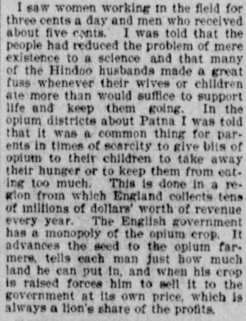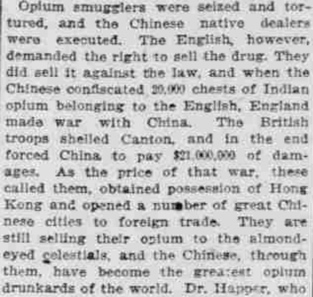
Lots of very concerned columns in American newspapers in 1900 re: Britain potentially losing India in light of the Boer War 

"The Sepoy massacre taught us something, and we are now able to control our native troops through their religious prejudices... I verily believe that this is our only safety. If there were no castes in India, there would be no English here" 

"In the opium districts about Patna I was told that it was a common thing for parents in time of scarcity to give bits of opium to their children to take away their hunger... This is done in a region from which England collects tens of millions of dollars' worth of revenue" 

"The British troops are largely made up of Sikkhs. These Indians are born fighters. I saw them everywhere I traveled through Hindostan" 

"What an act of retributive justice we should have if the English should lose India through China. It might be looked upon as a judgment upon the English for forcing opium upon China... Its acts during that war were the most disgraceful of history" 

"Opium smugglers were seized and tortured, and the Chinese native dealers were executed. The English, however, demanded the right to sell the drug..." 

"Dr. Harper, who was for forty-seven years a missionary at Canto, says that nearly every well-furnished house in that city has its opium couch, and that not only China, but also India, is full of opium drunkards" 

• • •
Missing some Tweet in this thread? You can try to
force a refresh




